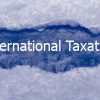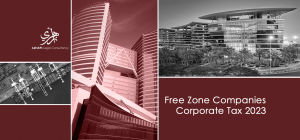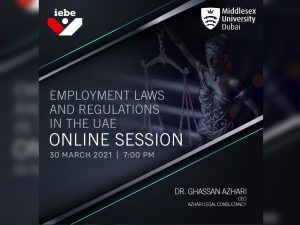This website uses cookies so that we can provide you with the best user experience possible. Cookie information is stored in your browser and performs functions such as recognising you when you return to our website and helping our team to understand which sections of the website you find most interesting and useful.
-

Will Be Free Zone Companies subject to the Corporate Tax?
As announced in January 2022, the United Arab Emirates will introduce a federal Corporate Tax […]
-

Employers’ rights during the Covid-19 Crisis
Resolution No. 279 of 2020 issued by the Ministry of Human Resources and Emiratisation on […]
-

Dr. Ghassan held a seminar at the Middlesex University Dubai
On 10th and 11th November 2019 Dr. Ghassan held a seminar on the “UAE Economic […]
-

Dr. Ghassan invited by Middlesex University
Dr. Ghassan has been invited by the Middlesex University for a special event of the […]
-

Dr. Ghassan appointed as Visiting Professor for ‘International Taxation’ at SRH Hochschule Berlin.
Dr. Ghassan teaching ‘international taxation’ at SRH Hochschule in Berlin. The university appointed Dr. Ghassan who is […]
-

Is Your Financial Information Subject to the “Automatic Tax Information Exchange
Following the ratification of the OECD’s Common Reporting Standard (CRS) in July 2014, some 104 countries […]
-

The Apple Ruling
The Untimely Death of “Double-Irish Dutch sandwich”? The ruling of the EU-Commission by which Apple […]
Recent Posts
- Will Be Free Zone Companies subject to the Corporate Tax?

- Protected: UAE Announced New Labour Law Regulations To Be Effective From February 2022

- SCHOLZ KAUFT STEUERDATEN AUS DUBAI –

STRAFFREIHEIT DURCH STEUERLICHE SELBSTANZEIGE - TODAY, Tuesday 30. March 7.00 PM: ‘Employment Laws and Regulations in UAE’ with Dr. Ghassan Azhari @ GoToMeeting Online

- Part 32 Offer – Early Disposal of Claims at DIFC Courts




